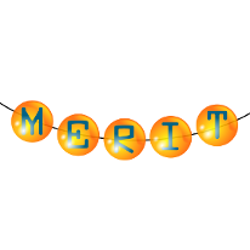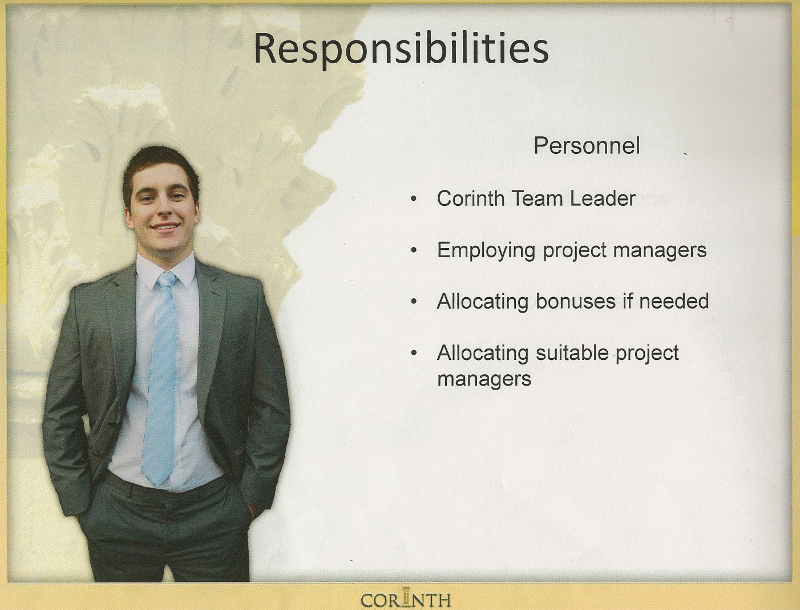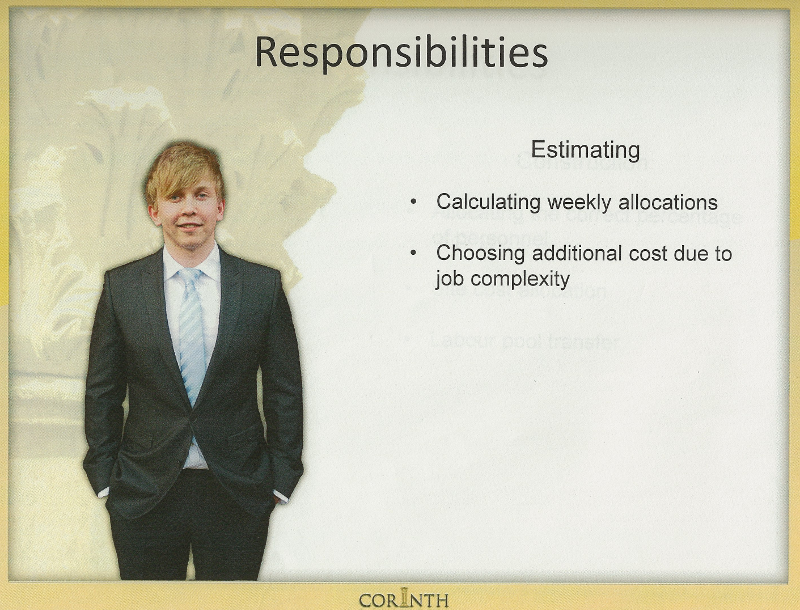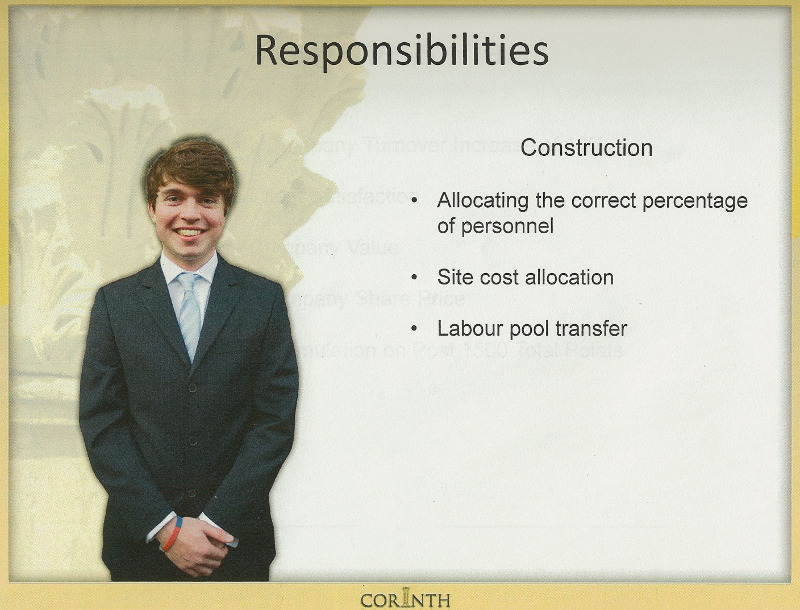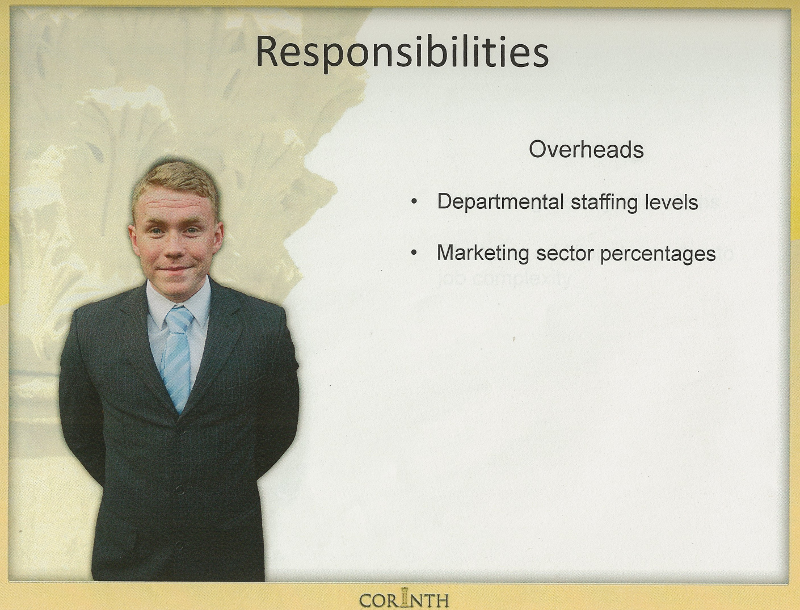MERIT 2013 has been set up to model a construction industry operating in an economy emerging from a recession with up to date bank interest rates and charges and current corporation tax. Learning to survive as a construction business in tough market conditions with fierce competition is the knowledge currently needed by our industry executives.
After completing eight rounds simulating two years of trading the top six teams will be invited to Loughborough University to experience a further two years of simulated trading in the MERIT 2013 final, the winning team will be presented with the ICE’s Silver Salver and named the 2013 MERIT Champion.
Registration
- Oct 2012 - Feb 2013
Trialling
- Mid. Dec 2012 - 14 Feb 2013
Submissions
- Round 1 - 18:00 GMT, Thursday 14 Feb 2013
- Round 2 - 18:00 GMT, Thursday 21 Feb 2013
- Round 3 - 18:00 GMT, Thursday 28 Feb 2013
- Round 4 - 18:00 GMT, Thursday 07 Mar 2013
- Round 5 - 18:00 GMT, Tuesday 12 Mar 2013
- Round 6 - 18:00 GMT, Thursday 14 Mar 2013
- Round 7 - 18:00 GMT, Tuesday 19 Mar 2013
- Round 8 - 18:00 GMT, Thursday 21 Mar 2013
Final at Loughborough University
- 11 & 12 April 2013
To discuss your requirements, you can either use the Contact Us page, or send send an email to: This email address is being protected from spambots. You need JavaScript enabled to view it.
Arrangements
We suggest that you indicate your requirements in terms of team numbers and timings. Arrangements will be made to:
- Register your teams on the MERIT system.
- Provide the students with the MERIT Tutorial.
- Operate MERIT during the trialling phase before the game begins and over the eight periods. There is an on-line query system through which students can have their queries answered by the MERIT Team. The trial sessions train the students before they start the game.
Support
- The main online support is the MERIT Tutorial and the online query system
- For UK Universities new to MERIT on the first occasion we will, depending on timing, provide either Professor Ron McCaffer, Professor Tony Thorpe or Dr Francis Edum-Fotwe to introduce MERIT to your students. On the first occasion this will be done on an expenses only basis. For subsequent years their will be a small charge.
- For International Universities outwith the UK we could come to a similar arrangement to talk to your students over SKYPE.
Cost
This depends on the number of teams and support required. An indicative cost will be provided quickly on any initial enquiry
Background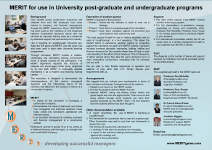
Over 30,000 young construction executives and students from over 200 employers have been trained in company and financial management through the MERIT experience. Since 1988 MERIT has been used as the Institution of Civil Engineers National Construction Business Game and has serviced an important training need as is evidenced by extensive support and sponsorship from industry.
Use in teaching at Loughborough University pre-dates the ICE game and MERIT, over the years, has also been used in twelve other University teaching programmes.
Through simulation MERIT creates a realistic, challenging and stimulating training environment which is greatly enjoyed by the participants. The MERIT experience expands the horizons of students and encourages further study. Supported by its own staff, MERIT is continually updated maintaining it as a modern and evolving training vehicle.
The simulation is designed to demonstrate the interdependence of the various managerial decisions and the interlocking nature of the variables that determine the success or failure of a construction company.
MERIT
- Is based on the simulation of managing a construction company.
- Demonstrates the value of teamwork and shows how managerial and technical decisions made today unfold into tomorrow's operational and financial results.
- Is an excellent introduction to company, business and financial management in a construction context.
Participants operate in groups of up to six, acting as a board of directors and managers, to manage their own construction company.
Operation of student games
MERIT is operated in three phases:
- Phase 1 - Teams trial the software in order to work out a strategy
- Phase 2 - Each team is competing against the simulation.
- Phase 3 - Each team competes against the simulation and each other for work and for key staff.
The most popular format for use in student programs and as used at Loughborough, is a 4+4 sequence. This allows the student teams to experience decision making by competing against the simulation for each of 4 MERIT periods. Decisions included overhead allocation, estimating, bidding, staffing and financial decisions for four periods where they will gain a clear understanding of the effect of their decisions. This is followed by 4 further periods where they take the same decisions but in a more competitive environment, competing both for contracts and key staff.
We are able to offer flexible sequences of operation and patterns of play other than 4+4. Simply discuss your requirements with us.
The MERIT University family
MERIT has been embedded as an assessed teaching module in degree programmes in the following Universities:
- Aberdeen University, Scotland
- Auckland University, New Zealand
- Canterbury University, New Zealand
- Loughborough University, Undergraduates, UK
- Loughborough University, Postgraduates, UK
- Melbourne University, Australia
- Newcastle University, Australia
- Waterford Institute of Technology, Republic of Ireland
- Glasgow Caledonian, Scotland
- Oxford Brookes University, UK
- Deakin University, Australia
- Anglia Ruskin University, UK
- George Brown College, Canada
Although the National Game is not intended for University participation and is directed at young engineers in industry the following Universities have entered teams:
- Cambridge University
- Dundee University
- Heriot Watt University
- Leeds University
- Universiti Teknologi, Malaysia
- Pennsylvania State University, USA
- University of Brighton
Introduction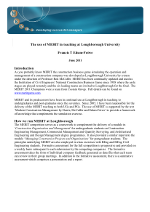
As you probably know MERIT the construction business game simulating the operation and management of a construction company was developed at Loughborough University by a team under the direction of Professor Ron McCaffer. MERIT has been continually updated and used as the Institution of Civil Engineers' National Construction Business Game since 1988 where the early stages are played remotely and the six leading teams are invited to Loughborough for the final. The MERIT 2016 Champions were a team from WS Atkins India. Full details can be found on www.meritgame.com.
MERIT and its predecessors have been in continual use at Loughborough in teaching to undergraduates and post-graduates since the seventies. Since 2005, I have been responsible for the delivery of the MERIT teaching to both UGs and PGs. The use of MERIT is supported by the text 'Modern Construction Management by Harris, McCaffer and Edum-Fotwe' to provide a framework of knowledge that complements the simulation exercise.
How we run MERIT at Loughborough
The MERIT competition serves as a coursework to complement the delivery of a module in 'Construction Organisation and Management' for undergraduate students on Construction Engineering Management, Commercial Management and Quantity Surveying, and Architectural Engineering and Design Management degree programmes. It also provided a similar input into the module 'Managing Construction Projects and Organisations' for postgraduate students. The principles underlying MERIT are also employed in class exercises with BEng and MEng Civil Engineering students. Formative assessment for the full competition is progressive and provided on a weekly basis subsequent to each submission by the competing companies. The formative assessment takes the form of individual company feedback generated as data files that each team can review in their group meetings. In addition to the formative assessment, there is a summative assessment which comprises a presentation and a report.
Basic operation and organisation
- The competition lasts for a period of seven weeks, although the session for each year covers ten weeks. The first three weeks are devoted to setting-up administrative procedures, as well serving as a familiarisation period. It also provides an opportunity for the competing companies to acquaint themselves with the nature of the competition and market conditions, as well as regulations that they need to comply with in order to successfully manage their company. Supporting this is the MERIT Tutorial and a set of trial runs which allows the student teams to experiment.
- Teams of usually up to six students set up a company to operate in a virtual construction market, and file the details of their organisation with the registrar of companies (the controller general for the simulation).
- The newly formed company commences business by taking over an existing organisation that is already trading with a defined history.
- The new team is required to manage their company in a construction market that comprises real and virtual competitors and defined by characteristics that mirror real-life construction.
- Successful management of the company in the virtual construction market is determined by a combination of performance indicators. The indicators address commercial, industry specific, as well as wider issues that construction organisations have to tackle in order to stay competitive. The performance of each company is viewed in absolute and relative terms. Absolute performance is established by the differential improvement or decline in a company's overall indicator. The relative performance is established through the use of a performance league table.
Student participation and interaction
- A week after the commencement of the actual competition, each company (i.e. student team) is required to file their organisation strategy with the registrar of companies(ie me).
- Each round, representing one quarter's trading the student teams are required to make and enter decisions on commercial, industry specific, as well as wider issues.
- To support the decision making student teams allocate duties to each team member such as Managing Director, Finance Director, Procurement Manager etc (from MERIT description). This allows each decision to be evaluated by the team expert and synthesised, often by their own simulations, to form the company decisions
- Each round requires the results or outcomes of the previous round to be analysed and evaluated and an assessment of where their decisions delivered and where they failed and why. Notes are made for the final report
- Each annual session of the competition ends with a presentation session which involves each of the competing companies reporting on their stewardship to the board and shareholders, this includes comparing their outcomes to their strategy, the changes in strategy made in response to trading outcomes.
- The student work for each member of the virtual company is evaluated by the team performance augmented with a peer evaluation.
In the 2010 -2011 session MERIT was run for eighteen teams made up of four to eight members in the undergraduate competition, and four teams made up of four members each in the postgraduate stream.
Benefits to students from the MERIT experience
- An opportunity to put into practice many of the theoretical concepts and knowledge required for their future careers. It translates the learning exercise from being an exercise in simply getting to 'know', to one of knowing what, how and when to apply the acquired knowledge.
- Awareness and development of inter-personal skills that would be required in the work environment.
- Develop and become aware of their leadership capabilities.
- Gain knowledge of what is required to manage construction companies, as a preparation for the senior stages of their career.
- Enhanced analytical skills for processing information which will form the basis of company decisions.
- Working in the virtual construction market of the future.
Supporting teaching and relationship with other aspects of the course
- As a vehicle for teaching, MERIT provides a useful problem-based learning environment to bring together many of the other learning requirements from other modules (especially the ones that relate to management of construction at the site, project, and company level).
- The nature of the simulation also reflects effective deployment of participative learning principles, which is increasingly gaining ascendancy in order to cater for the different ways in which individual students learn.
- MERIT achieves effective learning through action and decision making by the students.
Student response to the MERIT experience
- The students enjoy the interactive participation of the simulation, is a form of learning that appeals to the more experienced and less well experienced students. It drives them to find out more about the subject they are dealing with. It ranks as a more favoured form of learning than classroom lectures or individual coursework. The competitive nature of the simulation keep the students focussed, even when their strategy has gone badly awry they create new strategies to show recovery.
- The immediate effect of any decision the team makes on the prospects of their company, enables the students to explore what-if scenarios especially at the pre-competition phase of the simulation.
The benefits to the staff
- Achieving the difficult goal of effective learning by the students, which is often not attained with theory-oriented learning on its own.
- Practical demonstration of many of the concepts involved in managing companies and projects within the construction sector.
- Ability to adapt learning resources to address changing conditions in the construction market place to ensure relevant education for the future generation of construction industry leaders.
MERIT is in continuous use. MERIT remains at Loughborough, has not been replaced, and the same teaching team that developed MERIT is in place at Loughborough responding to student experience and evolving MERIT.
The elements of MERIT
MERIT simulates the operation of a construction company and offers training in Company, Business and Financial management in a construction context. The MERIT training experience raises the awareness of the participants to the high level company decisions and responses to market and other changes.
The participants learn through participating, taking decisions, seeing results. This is an active involvement in the learning process and is a learning approach that appeals to the young professional; and the more mature students.
The following outlines the key elements in which participants are required to take decisions. This requires a development of an understanding of the background to these decisions and the impact of them. This background can be obtained from the MERIT tutorial or through wider reading.
Company Management includes:
- determining the Company strategy, its target markets, target size in terms of turnover and value
- deciding on the head office support staff required
- which jobs in each market sector to bid for
- the estimating effort required to ensure accurate estimates
- the staffing of individual contracts through own labour, sub-contractors and project managers
Business Management includes:
- Determining the best market sectors
- developing and maintaining client relationships
- ensuring that the Company Management responds to the development of the market
Financial management includes:
- ensuring that the company has enough capital to support its workload
- ensuring that the company hasn't an excess of underused capital by investing
- managing the company's cash account
- determining the rewards paid to shareholders through dividends
Experiencing leadership challenges-teamwork
MERIT exposes participants to the totality of a business in a construction context and covers company management, financial management and business management.
These extend the participants thinking into topics and issues that they don't experience in their day to day work or studies. This raises their horizons, sets their own activities into a wider context and demonstrates the interconnections between all the elements of business that need to individually be successful to build a successful business.
However the key lesson is 'teamwork' or working together. Participating teams who take a casual approach to organising the decision making processes in the MERIT simulation perform less well. Some teams operate as a collective with each team member participating in every decision without clear individual responsibilities. These teams perform also perform less well.
The more successful teams are those that organise themselves as a 'Board of Directors' would and take decisions as company directors do. This means each team member having clear defined responsibilities. The individual team member needs to understand all aspects of the input to the decisions for which they are responsible. The team member is an individual specialist.
The key post is that of Chief Executive Officer or Managing Director or team leader. This role is the one that oversees the work of all others and their own responsibility as well. The CEO ensures that actions of each team member is taken on time and by questioning the colleague ensures that the recommendations they are making are sound.
Consider a Board Meeting. Each individual reports on their activity since the last meeting, makes recommendations and seeks approval of the Board. The CEO and other Board Members then interrogate the individual to test that the recommendations are soundly based and have not arrived at on a casual or ill-informed basis. In this way the quality of each suggested decision is tested.
Individual decisions such as employing labour or deciding with contracts to bid for sit within a 'Company Strategy', The strategy is the collective responsibility of the Board. Arrived at after each individual, responsible for their own area of responsibility has had an input. Strategy formulation will face conflicting senarios, conflicting views and conflicting data. These are resolved by disciplined discussion. The discipline is imposed by the CEO. This is leadership. The most important aspect of strategy is to determine whether it's achievable and how to implement it. Without these there is no effective strategy. The CEO together with their team of expert Board members must be convinced that they have a sound strategy.
However the greatest aspect of strategy is flexibility. When the original strategy doesn't work out, when the market changes, when competition increases, when the financial status is difficult, does the Board have the wit to recognise the changes and the strength to change the strategy. An effective Board will, a casual board will plough on with the original and now failing strategy. Flexibility is a strength.
The teams that adopt a disciplined approach to Board responsibilities, Board decisions, strategy reviews and responses are the most successful in MERIT simulations as they would be in life.
The successful teams adopt the mantle of senior directors they act like senior directors, conduct themselves as senior directors, talk like senior directors. Steeped in the MERIT simulation this role play becomes part of the simulation. Some even dress as senior directors when their Board meets. These committed teams have taken a step away from being junior staff or students and are adopting the attitudes and behaviour that will sustain them in the more responsible roles they will fill in times to come.
One team and their distribution of responsibilities
This was a serious fully committed team. Note their dress, they turned up to their own Board meetings dressed for business. They said that to get fully involved they had to act like business, talk like business and dressing like business reminded them that this was real, this wasn't just a game. These participants were preparing themselves for future tasks.
Reports from student teams on their MERIT training experience
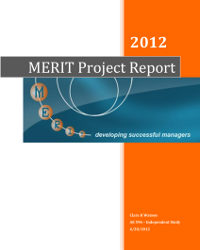 |
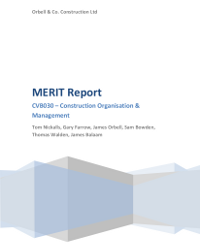 |
|
| Penn State University | Loughborough University |
MERIT provides experience of and training in:
- Company, business and financial management
- Issues of competition not only for work but also staff.
- The role of technical work and its contribution to commercial operations
- Understanding the whole business of the construction process
There are a range of experiences within MERIT and this depends on the role allocated to the individual team player.
Below is an overview of the broad range of issues that team players will experience:

The benefits of using the MERIT simulation as a learning vehicle are based upon principles of adult learning. It is widely accepted that adult learners acquire knowledge in a different way from the typical classroom environment.
Recognising that, MERIT utilises learning methodologies and tools that help transfer knowledge, skills and competencies that are needed to improve the business skills and understanding of young engineers so that they in turn deliver improved performance for their organisations.
In the jargon of education, MERIT is an action-learning exercise designed to anchor important lessons of business success with the participating teams. Thinking strategically, performing in the midst of chaos and balancing risk and reward, all play out in the simulation which most of the participants find engaging.
The simulation evolves and incorporates evolving legislative, regulatory and sector practices keeping the challenge of MERIT modern and relevant. Examples of changes introduced over the period of operation have included:
- Tools to enable detailed interactive analysis of key business areas
- Learning enhanced by detailed powerpoint tutorial, and participants can ‘trial’ the simulation prior to the start of a competition
- Move from a contracting company to a PLC with ability to invest in other businesses
- Enhancements to the 2-stage tendering process
- Developments of risk, and its affect on bidding and job progression
- Changes to the use of project managers to reflect what happens in the real world e.g., ‘golden hellos’, resignations, grudges
- Labour fluctuations in the market
- Expansion of the key performance indicators in line with industry trends
- Introduction of Quality and Health and Safety into the overhead function
- Client relationships impact on more areas of the business
|
 MERIT 2012 Champions - IMF (Impossible Mission Force) |
MERIT is an acronym for Management, Enterprise, Risk, Innovation and Teamwork and is a WEB based computer simulation that allows participants operating in groups of up to six, acting as a board of directors and managers, to manage their own construction company competing initially against the simulation and in final rounds against the other teams.
MERIT provides experience of and training in:
- company and financial management
- issues of competition not only for work but also staff.
- The role of the young engineers technical work and its contribution to commercial operations
- Understanding the whole construction process




